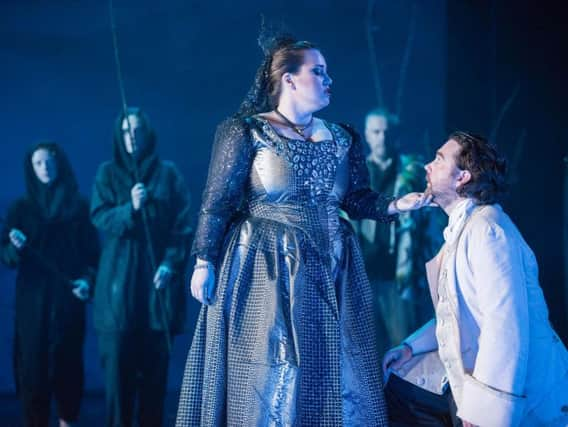Review: Magic and vigour abound in production of Mozart opera


The transformation from a difficult dress rehearsal on a cool overcast Monday to a splendidly sung, hugely enjoyable performance on a glorious, warm, sunny Saturday evening in the Cotswolds is something of a fairy tale. Yes, fairy tales do transform. With the attributes of both pantomime and fairy tale, Director, Thomas Guthrie, successfully recreates the story which appeals to all ages – the fairy story for children and the philosophic drama for adults.
Often fairy tales have a dark core. So it is with this production of the Magic Flute – how to deal with the strong link with Masonic rites and the number “three”. Mozart begins his overture with three strong chords, Tamino’s three qualities are proved by Sarastro, three ladies, three boys and three magic instruments make up the set. There is magic in the pit, where conductor Anthony Negus extends his 2017 season success with a tenacious performance. Flautist Diane Clark is his inspiration as she delivers with consistency and vigour throughout. Domonkos Csabay takes advantage of the Negus preference for celeste over glockenspiel and is delightfully positive.
Advertisement
Hide AdAdvertisement
Hide AdOf course, the flute features prominently as the most important instrument. Tamino’s magic flute, claimed by Parmina to be cut from the deepest depths of an oak and given as a gift by the Queen of the Night is central to the action, produces some of the finest singing of the evening. Julian Hubbard (Tamina) has supreme stage presence and enjoys the drama. Beate Mordal (Parmina) makes a successful return to Longborough bringing a very special degree of modesty and defiance. Defiance, too, is an attractive feature of Hannah Dahlenburg’s performance; she sings with conviction and influence as she hits the top notes in her second aria in D minor, Der Hölle Rache. She could be fiercer. Thanks to a dramatic stage manager intervention to allow time to solve a technical snag, the audience was treated to a second rendition, just as good, if not better, than the first. Full marks must go to Thomas Guthrie for his handling of a tricky moment.
Bass Jihoon Kim is solid as Sarastro, Grant Doyle (Papageno) brings some light-hearted merriment to proceedings as the bird-catcher, the three boys will enjoy the life changing experience opera offers, Sarah Gifford (Papagena) is chirpy and the three ladies offer sound advice with loads of enthusiasm.
With sets reminiscent of the 1983 Lehnoff production in Wiesbaden, Thomas Guthrie and designer Ruth Paton have demonstrated success in managing more with less.
As the fairy tale ends and the philosophic drama extends, there is recognition that the false power of the hypocrites is destroyed, the glory going to the enlightened.